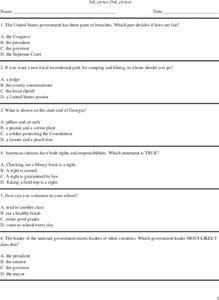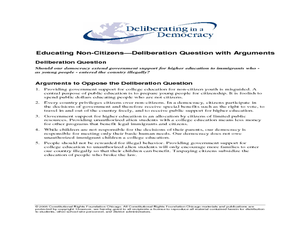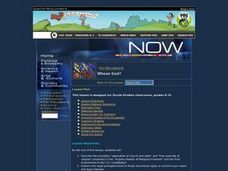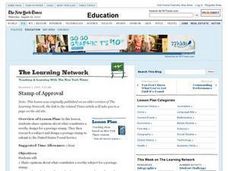Curated OER
Civics Review for Grade 3
In this civics review for grade 3 worksheet, 3rd graders answer 25 multiple choice questions about U.S. government in standardized test format.
Curated OER
The Great Debate Lesson Plan: Slavery in the U.S. Constitution
Students examine the U.S. Constitution to see what has been writte about slavery. Then, students, in groups, research the Constitutional Convention of 1787 to explore slavery compromises.
Deliberating in a Democracy
Educating Non-Citizens
Learners distinguish between the privileges of being a U.S. Citizen and privileges that are forfeited if not a U.S. Citizen. For this history lesson, students analyze the rights of people in a democratic society through research,...
Deliberating in a Democracy
Voting
Young scholars read about voting rights and compulsory voting in democracies. For this voting rights lesson plan, young scholars analyze the reasons for supporting and opposing compulsory voting and discuss whether compulsory voting is...
Curated OER
The Missouri Compromise of 1820
Students use a map of the Missouri Compromise to explain the geographical changes it brought to the U.S. and why the changes provoked a debate over the expansion of slavery in the U.S.
Curated OER
Creating A Bill Of Rights In Space
Young scholars define rights, analyze and apply the U.S. Bill of Rights to hypothetical situations, and create an Intergalactic Bill of Rights.
Curated OER
Cartoons for the Classroom: The Bush and Clinton Years
Examine how the Bush and Clinton years are an example of political dynasties. This cartoon provides a way to explore the concept and activate critical thinking skills in order to better grasp U.S. Politics. A fun and educational way to...
Curated OER
Plessy V. Ferguson: "Separate but Equal," Equal Protection
Students explore the details and impact of the Plessy vs. Ferguson U.S. Supreme Court case. In this U.S. History lesson, students participate in several group discussions and group activities that examine both sides of the famous...
Museum of Tolerance
The Role of Citizens in a Participatory Democracy
Groups research participatory democracies and compare the role and rights of citizens in ancient history with those in recent U.S. history. Guided by a series of questions, individuals compose a persuasive essay in which they discuss the...
Curated OER
Whose God?
Students investigate religious freedom in the U.S. They watch and discuss a Bill Moyers NOW video, take a Freedom of Religion quiz, write an essay, and participate in a mock trial and debate.
National Endowment for the Humanities
James Madison: Madison Was There
Madison was there! Scholars go on a journey to discover the person behind the founding father label as they explore James Madison's role in the formation of the United States government. The culmination is a writing assignment and...
Curated OER
U.S. Government & Indian Nations
Students explain the Constitutional basis of the Federal Indian relationship; summarize the Constitutional references to American Indians; and, evaluate the importance of the Northwest Ordinance of 1787.
Curated OER
The Alien and Sedition Acts
Students discover the conflicts that arose between the political parties over issues of foreign policy and economics. Using the Internet, they research the Alien and Sedition Acts and how they relate to the U.S. Constitution. They...
Curated OER
Government and Politics
After a class lesson the U.S. Constitution and its amendments, students can apply their knowledge to this activity. Several questions prompt students to add missing key terms, such as the year the Constitution was written and the number...
Curated OER
Representation of the Common Citizen From Declaration of Independence to Present
Students create working definition of common citizen, and investigate and discuss important sections of Declaration of Independence, Articles of Confederation, U.S. Constitution, Bill of Rights, and other Amendments. Students demonstrate...
Curated OER
A Nation's Voice
Students research the Constitution and the War Powers Act in order to determine what the powers of the government are in times of conflict. They answer a series of questions then write a legal brief either supporting or condemning the...
Curated OER
Readers Theatre: Presenting Historical Events Through Theatre
Students examine historical events. In this lesson on the US Constitution, students engage in a theatrical exploration of the Constitution and the Bill of Rights. They also engage in an extensive discussion, complete worksheets and draft...
Curated OER
School Bill of Rights
Students study the Bill of Rights. As a class, they create a "School Bill of Rights," with amendments. Students discuss the difference between rights and responsibilities and examine Supreme Court decisions dealing with the first ten...
Curated OER
What Are Our Common Values?
Students make a poster. In this values lesson, students read the Preamble to the Constitution and discuss the core democratic values that are found there and in the Declaration of Independence. Students are each assigned a core...
Curated OER
Civil Liberties and 9/11
Fifth graders examine the effects of 9/11 on two guarantees in the Preamble of the Constitution, the preservation of liberty and the establishment of common security. They examine how our personal liberties been affected by the 9/11...
Curated OER
Stamp of Approval
Students share opinions about what constitutes a worthy design for a postage stamp. They research a subject and design a postage stamp to submit to the United States Postal Service.
Curated OER
The Rights of the Child
Students create a set of rights that promote safety and tolerance at the school site. In this Bill of Rights lesson, students read the U.N. Declaration on Rights of the Child. Student presenters lead a discussion of these rights and have...
Curated OER
American Focus on World Constitutions
Ninth graders describe essential components of a constitution and cite cultural factors affecting international law-making.
Curated OER
We the People. . .
Learners explore the United States Constitution. In this government lesson, students write newspaper editorials that reflect their opinions about Amendments.

























